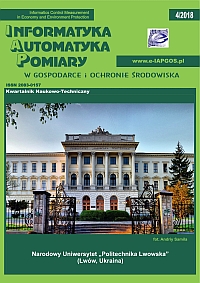IMPROVEMENT OF FIDELITY OF MOVING OBJECTS CLASSIFICATION IN GUARD SIGNALING COMPLEXES WITH SEISMIC SENSORS
Article Sidebar
Open full text
Issue Vol. 8 No. 4 (2018)
-
THE SOURCES OF RADIATION IN THE SHORT-WAVE RANGE ON THE BASIS OF II-VI HETEROLAYERS
Mikhail Slyotov, Alexey Slyotov4-7
-
ANALYSIS OF THE SEPARATION METHODS OF OPTICAL SPECTRA FOR INDIVIDUAL COMPONENTS
Viktor Makhniy, Oksana Kinzerska, Illia Senko8-11
-
FEATURES OF THE MANAGEMENT OF DATA ENCRYPTION KEYS IN THE CLOUD STORAGE MS SQL AZURE
Olexander Beley12-15
-
MULTICRITERIA SELECTION OF THE OPTIMAL DESIGN OPTIONS OF TELECOMMUNICATION FACILITIES
Valeriy Bezruk, Daria Chebotareva, Yulia Skoryk16-19
-
DEVELOPMENT OF THE METHOD OF INDIRECT STEGANOGRAPHIC DATA HIDING IN THE CONTAINER IMAGE CONTOUR
Volodymyr Barannik, Oleg Shatun, Dmitriy Barannik, Veronika Kobtseva20-23
-
STEGANOGRAPHY METHODS USED IN ATTACKS ON INFORMATION AND COMMUNICATION SYSTEMS
Anna Romanova, Sergiy Toliupa24-27
-
BUILDING INTRUSION DETECTION SYSTEMS BASED ON THE BASIS OF METHODS OF INTELLECTUAL ANALYSIS OF DATA
Serhii Toliupa, Mykola Brailovskyi, Ivan Parkhomenko28-31
-
OVERVIEW OF APPLICATIONS OF WIRE MEDIUM IN RADIO ENGINEERING MEANS
Mykola Khobzei, Dmytro Vovchuk, Magdalena Michalska32-35
-
IMPROVEMENT OF FIDELITY OF MOVING OBJECTS CLASSIFICATION IN GUARD SIGNALING COMPLEXES WITH SEISMIC SENSORS
Bohdan Volochiy, Mykhailo Zmysnyi, Leonid Ozirkovskyy, Volodymyr Onyshchenko, Yuriy Salnyk36-39
-
DEVELOPMENT OF THE REMOTE-PILOTED VEHICLE ALGORITHMIC SUPPORT AND ON-BOARD NAVIGATION COMPLEX STRUCTURE
Mykola Mykyjchuk, Volodymyr Markiv40-43
-
METHOD OF SAFE LANDING THE EMERGENCY QUADROCOPTER
Bohdan Blagitko, Yuriy Mochulsky44-47
-
IMPROVEMENT OF METHODS OF MOTION COMPENSATION OF DYNAMIC OBJECTS MOVING IN VIDEO STREAM OF THE VIDEOCONFERENCING SYSTEM
Volodymyr Barannik, Mykola Dvorsky, Valeriy Barannik, Viktoria Himenko, Anton Sorokun48-51
-
INFORMATION SYSTEM FOR ASSESSING THE PROFESSIONAL ACTIVITIES COMPLEXITY – THEORETICAL AND PRACTICAL ASPECTS OF IMPLEMENTATION
Oleg Zaritskyi52-55
-
SUN TRANSITS IN GEO SATELLITE SYSTEMS IN THE ASPECT OF RADIO WAVES PROPAGATION
Jacek Łukasz Wilk-Jakubowski56-59
-
INFLUENCE OF MOBILE ROBOT CONTROL ALGORITHMS ON THE PROCESS OF AVOIDING OBSTACLES
Piotr Wójcicki, Paweł Powroźnik, Kamil Żyła, Stanisław Grzegórski60-63
-
MODIFICATIONS OF MAXIMUM POWER POINT TRACKING P&O METHOD FOR PHOTOVOLTAIC PANEL
Piotr Kozierski, Adam Owczarkowski, Marcin Lis, Dariusz Horla64-67
Archives
-
Vol. 10 No. 4
2020-12-20 16
-
Vol. 10 No. 3
2020-09-30 22
-
Vol. 10 No. 2
2020-06-30 16
-
Vol. 10 No. 1
2020-03-30 19
-
Vol. 9 No. 4
2019-12-16 20
-
Vol. 9 No. 3
2019-09-26 20
-
Vol. 9 No. 2
2019-06-21 16
-
Vol. 9 No. 1
2019-03-03 13
-
Vol. 8 No. 4
2018-12-16 16
-
Vol. 8 No. 3
2018-09-25 16
-
Vol. 8 No. 2
2018-05-30 18
-
Vol. 8 No. 1
2018-02-28 18
-
Vol. 7 No. 4
2017-12-21 23
-
Vol. 7 No. 3
2017-09-30 24
-
Vol. 7 No. 2
2017-06-30 27
-
Vol. 7 No. 1
2017-03-03 33
-
Vol. 6 No. 4
2016-12-22 16
-
Vol. 6 No. 3
2016-08-08 18
-
Vol. 6 No. 2
2016-05-10 16
-
Vol. 6 No. 1
2016-02-04 16
Main Article Content
DOI
Authors
onishchenkovolodymyr@gmail.com
Abstract
The effectiveness of guard signaling complexes (GSC), when there is an important validity of the classification of moving objects (MO), is evaluated by the following indexes: probability of GSC task execution; probability of partial fulfillment of the task; probability of user’s “deception”. Accordingly, the performance indicators of the GSC, in turn, depend on the indexes of the functionality of its constituents: probability of fixation of moving object by seismic sensor, probability of correct classification of MO type and probability of receiving radio signal by the system of receiving and displaying information (SRDI). The article describes a discrete-continuous stochastic model of of GSC reaction to moving object crossing control zone, in which three seismic sensors are installed. Majority principle of identifying the type of moving object was used on the receiving part of the complex. A comparative analysis of the effectiveness of guard signaling complexes using one, two and three sensors in control zone are carried out.
Keywords:
References
Fedasiuk D. V., Volochiy S. B.: Method of development of structural automaton models of discrete continuous stochastic systems. Radioelectronic and computer systems 6(80)/2016, 24–34.
Koren Israel, Krishna C. Mani: Fault tolerant systems. Morgan Kaufmann Publishers is an imprint of Elsevier, 2007.
Pricon. Technical Information – Resource access mode http://www.signalsecurity.gr/html/pdf/brochures/psicon_brochure.pdf [1.10.2018].
Quantum multichannel seismic-acoustic system – Resource access mode: http://qtsi.com/wpcontent/ [1.10.2018].
Shooman M. L.: Reliability of Computer Systems and Networks: Fault Tolerance, Analysis, and Design. John Wiley & Sons, Inc., New York, 2002.
Volochiy B. Y.: Assessment of potential capabilities of guard signaling complex using seismic sensors. IEEE 9th International Conference on Dependable Systems, Services and Technologies (DESSERT) 2018, 435–441.
Volochiy B. Y.: Modelling of reaction of guard signalling complex to moving object appearance by seismic sensors placed in far and close control zones. Military technical collection. Army Academy 1(10)/2014, 7–13.
Volochiy B. Y.: Modelling the reaction of guard signaling complex on appearance of moving object when seismosensors are deployed in far and close control zones. Modern problems of radio engineering, telecommunications and computer science: proceedings of the International Conference TCSET’2014, Publishing National University ″Lviv Politechnic″, Lviv 2014, 252–254.
Volochiy B. Y.: Research of the dependence of the guard signaling complex on the location of seismic sensors. Eastern-European Journal of Eenterprise Technologies 2/9(68)/2014, 54–60.
Volochiy B. Y.: Technology of modelling algorithms of information systems behavior. NU ″Lviv Politechnika″, Lviv 2004.
Zvezhynskii S. S.: Perimeter concealed seismic detection means. Special equipment 2/2004, 20–28.
Zvezhynskii S. S.: Problem of choosing perimeter detection means. BDI 4(44)/2002, 36–41.
Article Details
Abstract views: 436
License

This work is licensed under a Creative Commons Attribution-ShareAlike 4.0 International License.






